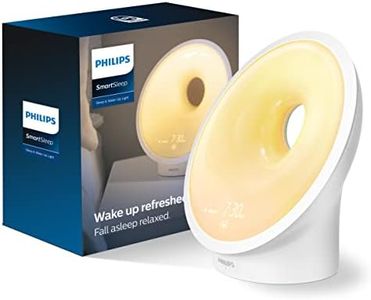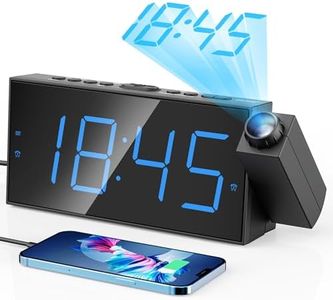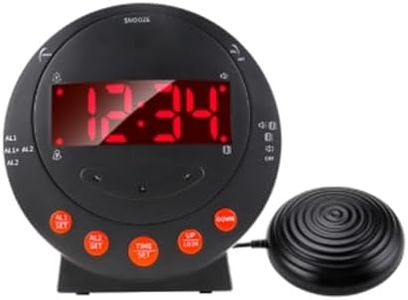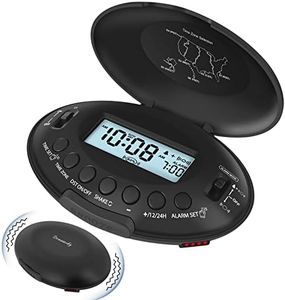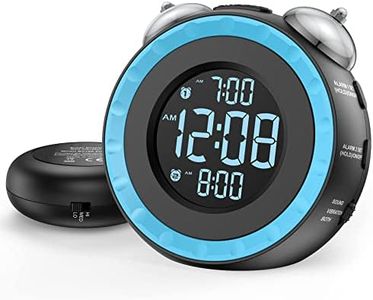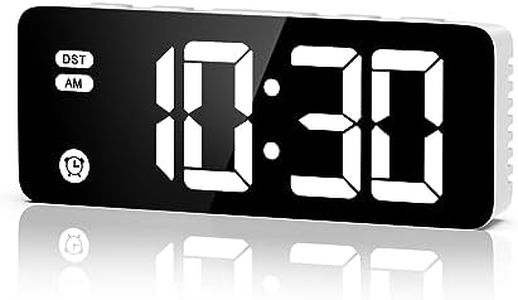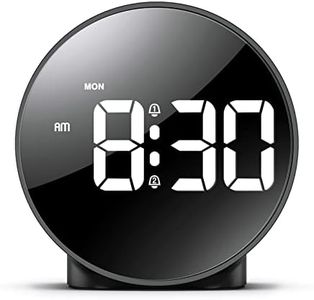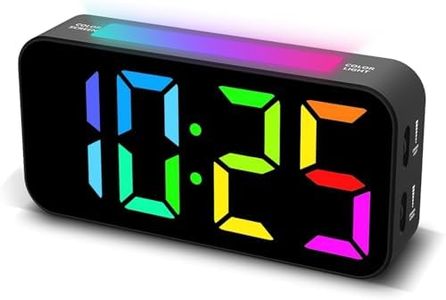We Use CookiesWe use cookies to enhance the security, performance,
functionality and for analytical and promotional activities. By continuing to browse this site you
are agreeing to our privacy policy
10 Best Alarm Clocks For Heavy Sleepers
From leading brands and best sellers available on the web.By clicking on a link to a third party's website, log data is shared with that third party.
Buying Guide for the Best Alarm Clocks For Heavy Sleepers
Buying an alarm clock for heavy sleepers means finding a product that can reliably wake you up, no matter how deeply you sleep. The right alarm clock should have features that match your specific challenges with waking up, whether that's very loud alarms, strong vibrations, or clever functionalities to make turning it off less tempting. Understanding the various specifications will help you choose a clock that actually works for you and fits your lifestyle.Volume LevelThe volume level of an alarm clock refers to how loud the alarm can get. This is especially important for heavy sleepers who may not wake up to standard alarm sounds. Volume is usually measured in decibels (dB), with regular clocks having lower maximum volumes and heavy-sleeper clocks offering very high ones. Models typically range from 70 dB (about as loud as a vacuum cleaner) to over 110 dB (as loud as a rock concert). If you only struggle a bit to wake up, a moderately loud clock may be enough, but for very deep sleepers or those who ignore alarms, the highest volume options are better.
Vibration FeatureSome alarm clocks for heavy sleepers use a vibrating pad or shaker, which goes under your pillow or mattress. Vibration is an important feature if sound alone isn’t enough, or if you need to wake up without disturbing others. Vibration strength can range from gentle buzzes to powerful shakes. If you share a room or are worried about not hearing the alarm, a strong vibration can be a great match for you.
Multiple Alarm SettingsHaving multiple alarm settings means you can set different times, sounds, or methods for one or several alarms. This is helpful if you want a backup alarm in case you ignore the first, or if you and a partner have different waking times. Some clocks allow you to set several alarms per day, which adds flexibility if your schedule changes often. If you need more than one reliable nudge in the morning, pick a model with this feature.
Sound Types and CustomizationAlarm clocks may offer various sound options, from traditional beeps to nature sounds or customizable tones. The importance of this feature depends on how your brain reacts to different noises—some people might get used to the same sound and start ignoring it. Being able to change the sound, adjust tone, or add variety can help make sure the alarm stays effective. If you get used to sounds quickly, choose a clock with customizable or multi-tone alarms.
Display Brightness and SizeThis refers to how easily you can see the clock and control how bright its screen is. Large, clear displays are helpful for quickly checking the time, especially if you wear glasses or have poor vision. Adjustable brightness is important because some people are sensitive to light when sleeping, and a very bright display can disrupt your rest. Pick a clock that allows you to dim the display or turn it off if you like a dark bedroom, or a big, bright one if you need easy viewing.
Power Source and Battery BackupAlarm clocks can be powered by plugging into a wall, with batteries, or both. Battery backup is critical in case of power outages; without it, you risk missing your alarm if the power goes out. If you live in an area with unreliable power or want to make sure you’re always covered, choose a clock with a reliable battery backup. If you travel or like to move your clock around, a portable, battery-powered model might be best.
Ease of UseThe layout and controls of the alarm clock affect how simple it is to set and change alarms, adjust settings, and turn off the alarm when you’re half asleep. Simple, large buttons and clear instructions make a big difference, especially if you don’t want to fumble in the morning. If you prefer simple operation, choose a clock with intuitive buttons and visible labels; avoid complicated menus if technology isn’t your thing.
Extra Features (e.g., sunrise simulation, puzzle alarms)Some alarm clocks have extra features like gradually increasing light (simulating a sunrise), or requiring you to solve a puzzle or physically get up to turn them off. These are designed to help wake your brain more gently or prevent you from simply hitting snooze. If you have a hard time getting out of bed or tend to shut off your alarm while half asleep, features like sunrise simulation or interactive alarms may be helpful for you.
